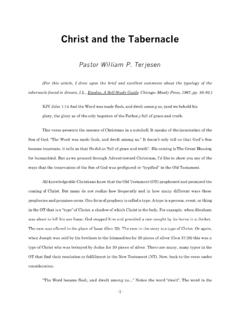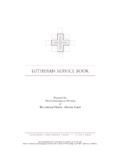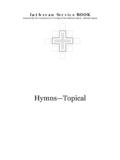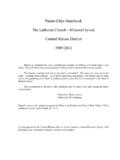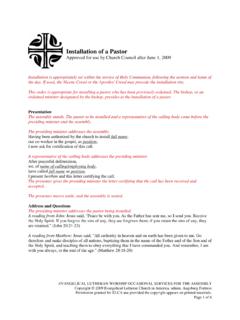Transcription of STRAIGHT TALK ABOUT CLOSED COMMUNION by …
1 STRAIGHT TALK ABOUT CLOSED COMMUNIONby Pr. William P. TerjesenDear Pastor,1. We have been hearing a lot ABOUT CLOSED COMMUNION recently. What is it?I'm glad you asked. CLOSED COMMUNION (some call it 'close COMMUNION ') is the Bible-based practice of normally communing only those who have been properly instructed in theteachings of the Ev. Lutheran Church and who have shown, through confirmation, profession offaith, or other proper reception into one of our churches, that they are united with us in faith anddoctrine. We do this because the Bible tells us that people who fail to 'discern the body of theLord' eat and drink judgment upon themselves,1 Corinthians 11:27-29 27 Therefore whoever eats this bread or drinks this cup ofthe Lord in an unworthy manner will be guilty of the body and blood of the But let a man examine himself, and so let him eat of the bread and drink of thecup.
2 29 For he who eats and drinks in an unworthy manner eats and drinksjudgment to himself, not discerning the Lord's body. and because communing people of a different faith violates the secondary purpose of thesacrament as a testimony to the unity of faith. Acts 2:42 42 And they continued steadfastly in the apostles' doctrine andfellowship, in the breaking of bread, and in prayers. Romans 16:17 17 Now I urge you, brethren, note those who cause divisions andoffenses, contrary to the doctrine which you learned, and avoid them. Look carefully at what the Lord is saying in these three passages of Scripture.
3 Proper, faithfuladministration of the Sacrament of the Altar presupposes the practice of CLOSED When I look around at the church today, I see that many pastors and congregations do notpractice CLOSED COMMUNION , and this includes many Missouri Synod congregations and CLOSED COMMUNION simply the personal opinion of some of our more conservative pastors suchas yourself? Is each Missouri Synod pastor free to decide for himself whether or not he willpractice CLOSED COMMUNION ?Your observations are very perceptive. Most 'protestant' churches in the world todaypractice 'open COMMUNION ', allowing more or less anyone who wishes to commune to do so.
4 Theydo this because they do not believe that the true body and blood of Christ are present anddistributed in the Sacrament, and because they do not adhere to what the Bible teaches aboutchurch fellowship and doctrinal unity. 'Open COMMUNION ' is also practiced by liberal andpietistical Lutheran Churches like the ELCA (Evangelical Lutheran Church in America) and theLutheran Brethren, because to one degree or another these churches have abandoned the clearteachings of the Bible and our Lutheran Confessions (Book of Concord).Sadly, I must admit, that many pastors and congregations in our Missouri Synod haveabandoned the practice of CLOSED COMMUNION .
5 This is especially true in the so-called 'Salt-WaterDistricts' of our Synod. In the heartland of our country, you will still find many LCMS congregations and pastors who faithfully practice CLOSED COMMUNION . This abandonment ofclosed COMMUNION by so many pastors and congregations is disheartening to Synodical officials,pastors and congregations who wish to remain faithful to this Bible-based practice, and it causes1much confusion and distrust within our COMMUNION is most definitely NOT simply the personal opinion or practice ofsome of our more conservative pastors. It is not an option that each pastor may do or not do as hesees fit.
6 I do not seek to practice CLOSED COMMUNION because I personally like being strict aboutthese things, or because I like to assert my dominance over people. If I were to bar the way toHoly COMMUNION for people simply on the basis of my personal preference or opinion, and noton the basis of the Word of God, the Lutheran Confessions and the theology and practice of theMissouri Synod, I would be a cad, a lout, and a false teacher. No, those who practice closedcommunion do so precisely because it is taught in the Bible and the Book of Concord, and is theofficial position of the Lutheran Church-Missouri me quote for you the Missouri Synod's official position in this matter:Theology and Practice of the Lord's Supper, A Report of the Commission onTheology and Church Relations, LCMS, May 1983.
7 "In keeping with the principle that the celebration and reception of the Lord'sSupper is a confession of the unity of faith, while at the same time recognizingthat there will be instances when sensitive pastoral care needs to be exercised,the Synod has established an offical practice requiring 'that pastors andcongregations of the LCMS, except in situations of emergency and in specialcases of pastoral care, commune individuals of only those synods which arenow in fellowship with us.' By following this practice whereby only thoseindividuals who are members of the Synod or of a church body with which theSynod is in altar and pulpit fellowship are ordinarily communed, pastors andcongregations preserve the integrity of their witness to the Gospel of Christ as itis revealed in the Scriptures and confessed in the Lutheran confessionalwritings.
8 " (1967 Res. 2-19. See also 1969 Res. 3-18 and 1981 Res 3-01)Brief Statement of the Doctrinal Position of the Missouri Synod, p. 14."Since God ordained that His Word only, without the admixture of humandoctrine, be taught and believed in the Christian Church, 1 Pet. 4:11; Jn. 8:31-32;1 Tim. 6:3-4, all Christians are required by God to discriminate betweenorthodox and heterodox church-bodies, Mat. 7:15, to have church-fellowshiponly with orthodox church-bodies, and, in case they have strayed into heterodoxchurch-bodies, to leave them, Rom. 16:17. We repudiate unionism, that is,church-fellowship with the adherants of false doctrine, as disobedience toGod's command, as causing divisions in the Church, Rom.
9 16:17; 2 Jn. 9-10, andas involving the constant danger of losing the Word of God entirely, 2 Tim. 2:17-21."The orthodox character of a church is established not by its mere name nor byits outward acceptance of, and subscription to, an orthodox creed, but by thedoctrine which is actually taught in its pulpits, in its theological seminaries,and in its publications."What is the responsibility of pastors and congregations with respect to this officialposition of the Missouri Synod? Our Handbook says, "The constitution, bylaws, and all otherrules and regulations of the Synod apply to all congregational and individual members of Synod expects every member congregation to respect its resolutions and to considerthem of binding force if they are in accordance with the Word of God and if they appearapplicable as far as the condition of the congregation is concerned.
10 " ( , pp. 32-33) So, pastorsand congregations are not free to choose whether or not to practice CLOSED COMMUNION . Honesty2and duty requires that we abide by the resolutions of Synod if they are in accord with the Wordof God. And, as will be shown below, the Synod's policy IS in accord with the Word of Is CLOSED COMMUNION a new idea in the church?No. CLOSED COMMUNION is as old as the Lord's Supper. In the early church, visitors andcatechumens (people receiving instruction in preparation for Baptism and church membership)were allowed to attend the service until the sermon was ended. Then they were escorted out ofthe church and the doors were shut so that only the members were even present during thecommunion service addition, travelling Christians were given letters of recommendation from their pastorsso that they would be welcomed to Holy COMMUNION by the pastors of the churches they visitedin their travels.
